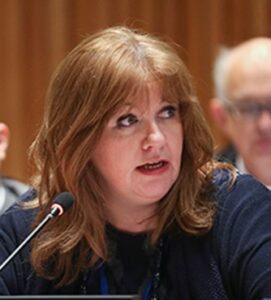December 06, 2023
Elevating the Role of Active Mobility at COP28
A note from Heather Thompson, CEO of ITDP, and Sheila Watson, Deputy Director of the FIA Foundation.


Cities worldwide must find more ways to meet urban mobility demands while ensuring transport is made affordable, inclusive, and sustainable by reducing harmful emissions. Safe, accessible active mobility infrastructure is a key solution to the climate crisis by providing people with more opportunities to shift away from fuel-intensive transport towards walking and cycling.
On this thematic Transport Day at COP28 UAE, ITDP and the FIA Foundation call for more attention to walking and cycling infrastructure as a vital climate solution for the transport sector. Our organizations’ recent research provides essential evidence demonstrating active mobility’s environmental, social, and economic benefits while also making it clear that it has not been, but needs to be, a priority of all UNFCCC countries.
A recent report from PATH (Partnership for Active Travel and Health)—a global coalition coordinated by the FIA Foundation—assessed National Policies for Walking and Cycling across the 197 UNFCCC parties and contends that most of them undervalue the potential of safe pedestrian and cycling environments in their regions. The report finds that just eight countries have consistently linked walking and cycling between their national policies and the Nationally Determined Contributions (NDCs) outlined in the Paris Agreement. Furthermore, only a handful of NDCs mention investments and resources for active mobility modes.
The report also identifies a clear disparity between UNFCCC parties—high-income countries tend to have more national policies on walking and cycling (47%) compared to upper-middle, lower-middle, and low-income countries. Thus, there is an urgent need to build capacity to support the third of UNFCCC countries that have yet to embrace active mobility in their NDCs, particularly in low- and middle-income nations where safe walking and cycling infrastructure is often the most under-resourced. The report calls for much more ambition, action, and investment amongst UNFCCC parties in terms of active mobility commitments for them to leverage the full emissions reduction potential of cities built around walking and cycling.
Regarding cycling in particular, the PATH report found that only 5% of UNFCCC countries have a national policy and an NDC addressing the role of cycling. In 2022, ITDP and the FIA Foundation released the report Protected Bicycle Lanes Protect the Climate to make the case that networks of protected bicycle lanes in low- and middle-income cities have immense potential to reduce emissions, lower transport costs, and prevent road fatalities in a highly cost-effective way.
The research advocates for connected networks of physically protected bicycle lanes—rather than disconnected, unprotected lanes or other policy measures—as the most critical factor in encouraging the uptake of cycling in cities. The study offers one of the first-ever empirical measures of greenhouse gas reductions from networks of protected bicycle lanes in low- and middle-income countries. To reduce emissions and improve residents’ quality of life, the research contents that decision-makers and funders should make more resource and policy commitments to scaling protected cycling infrastructure in major cities.
Ultimately, we know that enabling more people to walk and cycle safely is a quick, affordable, and reliable way to reduce transport-related emissions while improving public health outcomes in a rapidly urbanizing world. Our reports are part of a growing body of evidence that shows that active mobility infrastructure is crucial to a sustainable, equitable future. They also serve as a call to action to all governments, development banks, philanthropy actors, and civil society organizations to elevate walking and cycling in their conversations and make stronger commitments in both policy and investment.

